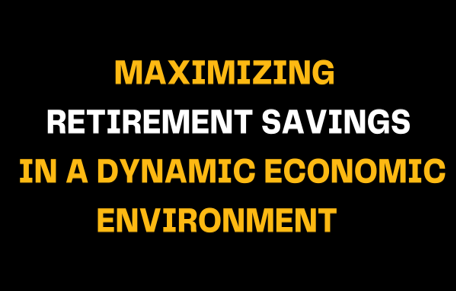Read Time4 Mins
Retirement planning is an essential aspect of financial planning. However, planning for retirement in the current economic climate can be challenging. With economic uncertainty, low interest rates, and market volatility, it’s important to take a strategic approach to retirement planning.
Here are some tips to help you navigate retirement planning in the current economic climate.
1.Start planning early
The earlier you start planning for retirement, the more time you have to save and invest. Even if retirement seems far away, it’s important to start planning as soon as possible. This will give you more time to build up your retirement savings and take advantage of compound interest.
2.Determine your retirement income needs
Before you can start saving for retirement, you need to determine how much income you will need in retirement. This will depend on factors such as your lifestyle, expected expenses, and other sources of income such as Social Security. Once you have a clear idea of your retirement income needs you can start developing a savings plan to meet those needs.
3.Consider different retirement savings options
There are a variety of retirement savings options available, including 401(k)s, IRAs, and Roth IRAs. Each option has its own benefits and drawbacks, so it’s important to understand the differences and choose the option that best meets your needs. Your financial advisor can help you determine which retirement savings option is right for you.
4.Diversify your retirement portfolio
Diversifying your retirement portfolio can help to reduce risk and ensure that you have a stable source of income in retirement. This means investing in a mix of stocks, bonds, and alternative assets such as real estate. Diversification can help to mitigate the impact of market volatility and ensure that your retirement savings continue to grow over time.
5.Consider delaying Social Security
Delaying Social Security can increase your retirement income over the long term. By delaying Social Security until age 70, you can increase your monthly benefit by up to 8% per year. This can be a valuable source of income in retirement, especially if you have other sources of retirement income that can cover your expenses until you start receiving Social Security.
6.Plan for healthcare expenses
Healthcare expenses can be a significant cost in retirement. It’s important to plan for these expenses and ensure that you have adequate coverage. This may include purchasing supplemental insurance or setting up a Health Savings Account (HSA). Your financial advisor can help you develop a plan for managing healthcare expenses in retirement.
7.Adjust your retirement plan as needed
The economic climate can change quickly, so it’s important to adjust your retirement plan as needed. This may include changing your investment portfolio management strategy, increasing your savings rate, or adjusting your retirement income goals. Regularly reviewing your retirement plan and making adjustments can help you stay on track to meet your retirement goals.
In conclusion, retirement planning in the current economic climate requires a strategic approach. By starting early, determining your retirement income needs, diversifying your retirement portfolio, considering delaying Social Security, planning for healthcare expenses, and adjusting your retirement plan as needed, you can navigate economic uncertainty and achieve your retirement goals. Remember to work with a trusted financial advisor who can help you develop a personalized retirement plan that meets your unique needs and goals.






